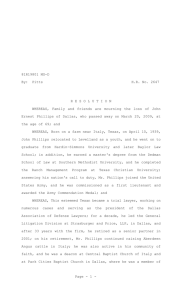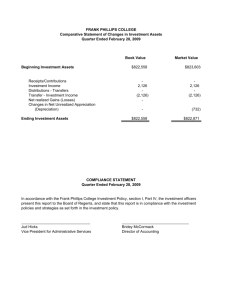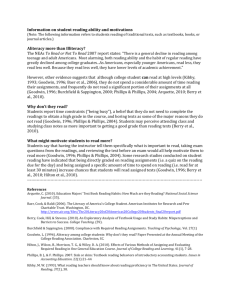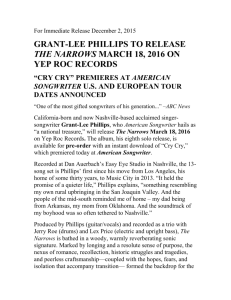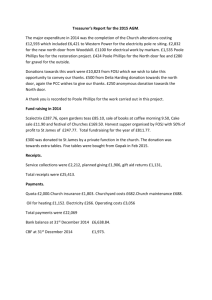pdf version - Liège Language and Literature L3
advertisement
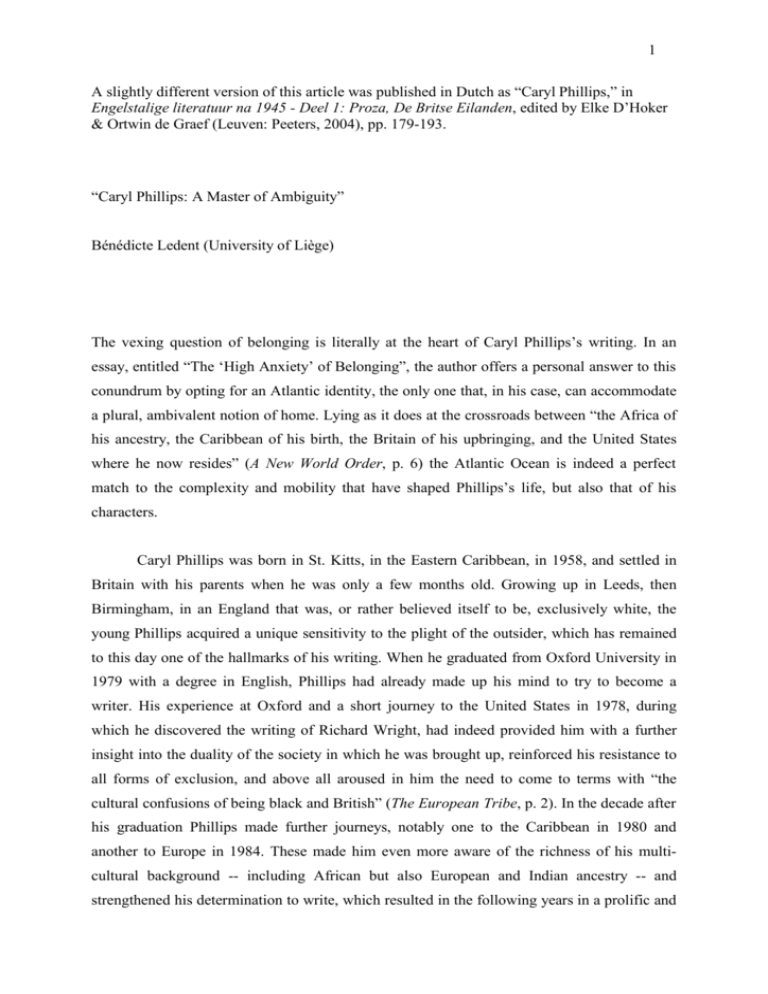
1 A slightly different version of this article was published in Dutch as “Caryl Phillips,” in Engelstalige literatuur na 1945 - Deel 1: Proza, De Britse Eilanden, edited by Elke D’Hoker & Ortwin de Graef (Leuven: Peeters, 2004), pp. 179-193. “Caryl Phillips: A Master of Ambiguity” Bénédicte Ledent (University of Liège) The vexing question of belonging is literally at the heart of Caryl Phillips’s writing. In an essay, entitled “The ‘High Anxiety’ of Belonging”, the author offers a personal answer to this conundrum by opting for an Atlantic identity, the only one that, in his case, can accommodate a plural, ambivalent notion of home. Lying as it does at the crossroads between “the Africa of his ancestry, the Caribbean of his birth, the Britain of his upbringing, and the United States where he now resides” (A New World Order, p. 6) the Atlantic Ocean is indeed a perfect match to the complexity and mobility that have shaped Phillips’s life, but also that of his characters. Caryl Phillips was born in St. Kitts, in the Eastern Caribbean, in 1958, and settled in Britain with his parents when he was only a few months old. Growing up in Leeds, then Birmingham, in an England that was, or rather believed itself to be, exclusively white, the young Phillips acquired a unique sensitivity to the plight of the outsider, which has remained to this day one of the hallmarks of his writing. When he graduated from Oxford University in 1979 with a degree in English, Phillips had already made up his mind to try to become a writer. His experience at Oxford and a short journey to the United States in 1978, during which he discovered the writing of Richard Wright, had indeed provided him with a further insight into the duality of the society in which he was brought up, reinforced his resistance to all forms of exclusion, and above all aroused in him the need to come to terms with “the cultural confusions of being black and British” (The European Tribe, p. 2). In the decade after his graduation Phillips made further journeys, notably one to the Caribbean in 1980 and another to Europe in 1984. These made him even more aware of the richness of his multicultural background -- including African but also European and Indian ancestry -- and strengthened his determination to write, which resulted in the following years in a prolific and 2 original production. This includes several scripts, among which Playing Away (1987) which centres on a cricket game between an inner city West Indian team and their rural English opponents; three plays, Strange Fruit (1981), Where There is Darkness (1982) and The Shelter (1984) which address the West Indian experience in Britain as well as the relationship between the white woman and the black man; two novels, The Final Passage (1985) and A State of Independence (1986) which deal respectively with post-war Caribbean migration to Britain and with neo-colonialism in a Caribbean island on the verge of independence; and finally a travel essay, The European Tribe (1987), which Phillips describes in the preface as “a notebook in which I have jotted various thoughts about a Europe I feel both of and not of” (The European Tribe, p. xiii). Unlike his creative writing, where he always steers clear of anger, this book of non-fiction contains an incisive anatomy of European racism whose openly political message did not garner general approval. Phillips entered another phase of his writing after staying in the Caribbean for two years at the end of the eighties and starting an academic career that took him to India, Sweden and, finally, Amherst in the United States. With Higher Ground (1989), Cambridge (1991), Crossing the River (1993) and The Nature of Blood (1997), four novels which met with great critical acclaim and won him major awards, Phillips broadened the scope of his fiction. While his first two novels focus on the tense interaction between the Caribbean and Britain through the figures of migrants, these later novels tackle wider-ranging topics. Higher Ground and Crossing the River are about the African slave-trade, and span the history of the African diaspora, both in the New World and Europe. Cambridge, set on a nineteenth Caribbean plantation, addresses slavery and the complexity of the master/slave relationship. And The Nature of Blood puts side by side the Jewish Holocaust, the persecution of Jews in the fifteenth century, the predicament of an Othello-like figure in sixteenth century Venice, and the rejection of Ethiopian refugees in contemporary Israel. In the nineties, Phillips also expanded the range of his talents to include criticism and editing, which resulted in two anthologies, Extravagant Writers: A Literature of Belonging (1997), a collection of texts by British writers born abroad, and The Right Set (1999), a volume on tennis; in the same period he also wrote an impressive number of essays that were to be collected together with earlier pieces in A New World Order: Selected Essays (2001). From 1998 to 2005 Phillips was professor of English at Barnard College, University of Columbia, in New York where he is currently based. He is now professor at Yale University. 3 Though he has recently devoted much time to non-fiction, publishing The Atlantic Sound in 2000 as well as regular review articles in the press, he has also continued to write fiction. His novel, A Distant Shore (2003), examines the state of contemporary Britain which is reluctantly coming to terms with the social and cultural changes taking place in her midst. To that extent, this new novel may represent a departure from the rest of Phillips’s fiction which, with the exception of A State of Independence, is always set in a more or less distant past, even though it is of obvious relevance to the present. However, Phillips’s interest in the past, is again at the heart of his latest novel, Dancing in the Dark (2005), which revisits the life of Bert Williams, a Caribbean-born entertainer, who became the best-paid black comedian in the United States at the beginning of the twentieth century. His fate was nonetheless tragic for Williams, who blacked up to go on stage, owed his success to his pandering to racial stereotypes. Phillips’s sensitive and subtle narrative raises such crucial questions as the responsibility of the artist and the difficulty of being oneself in a society that pays exclusive attention to what you look like at the expense of who you are. Like many other writers coming from the so-called margins of the former British Empire, such as Salman Rushdie or Hanif Kureishi, Caryl Phillips has become one of the major figures of contemporary English literature and has contributed through his fiction to the formal and thematic renewal of a literary tradition that used to be essentially realistic and was occasionally given to parochialism. It is worth adding that this originality was already typical of some of Phillips’s West Indian precursors in Britain, like Wilson Harris, George Lamming or Sam Selvon, but Phillips is the first writer of Caribbean origin to be recognised as belonging to the “mainstream” of British literature, with the exception of Trinidadian V.S. Naipaul who writes in an altogether more conventional vein. In his novels, Phillips substitutes the traditionally linear narrative with fragmented tales that shuttle in time and space and whose disruptions aptly evoke the lives of his displaced, usually dislocated, characters. Whereas The Final Passage and A State of Independence combine a unity of action with flashbacks, his later novels rely on a more or less straightforward juxtaposition of isolated, often lyrical, voices which are separated from each other by gender, race, class and often time, yet share a common experience of pain and an almost instinctive urge to hope against all odds. Higher Ground provides an early but enlightening example of this diffracted structure which has become ever more labyrinthine and intricate with each new book. The 1989 novel consists of three separate narratives focusing on three figures: a nameless African interpreter in the service of European slave-traders in the eighteenth century; Rudi, a militant African American 4 inmate in a high-security prison in the 1960s and Irina, a mentally fragile Jewish refugee in post-war London. Although the three stories are written in completely different styles matching the divergent personalities of the protagonists and their backgrounds, they also echo each other emotionally and linguistically, so that the book taken as a whole resembles an intricate web woven between these three tormented souls who are all “trying to survive a journey” (Higher Ground, p. 218). But Phillips’s contribution to contemporary English literature is also thematic and lies in extending and subverting the usually confined canvas of English fiction, which he does by addressing haunting themes that call the existing order into question and, as we will see, by focusing on characters who are usually left out of traditional historiography. Not only do his novels relentlessly alert their readers to the hidden history of the West, that of the transatlantic slave-trade, for example, but they also underline Britain’s inherent, though long negated, heterogeneity. Whereas slavery and the “other” presence in England were either inexistent or, at best, figured as side issues in most English novels until the 1990s, they have become central issues in Phillips’s writing. So, in the middle of the Thatcher era, his first novel, The Final Passage, draws attention to the predicament of the pioneer generation of Caribbean immigrants whose arrival in Britain after the Second World War was to change British society for ever. Similarly, Cambridge and Crossing the River underscore the fact that the slave-trade and slavery belong as much to British history as that of the New World, while The Nature of Blood highlights the exclusive treatment that Europe, England included, has at all times reserved to the outsiders, whether black or Jewish, settling on her territory. In A Distant Shore, Phillips acts once again as a precursor by focusing on Britain as a society in flux, addressing the burning question of asylum seekers, and wondering how the arrival of these newcomers affects the local population but also the refugees themselves. Finally, Dancing in the Dark, though set in the United States, deals with identity issues that have become burning ones in contemporary Britain too. For all its originality in form and subject-matter, however, Phillips’s writing does not radically sever all links with the influences, literary and otherwise, that have shaped him as a writer, be it through his education or his personal affinities. On the contrary, his work rests on a complex and extensive intertextual web that acts as a multiple marker of ambivalence, subversion, but also of cultural richness. Undoubtedly, many of the references that Phillips makes to other texts convey his simultaneous attachment to and detachment from existing 5 traditions, whether English, African American or Caribbean. For example, his rewriting of Othello in The Nature of Blood testifies to his debt to Shakespeare, some of whose plays he directed as a student at Oxford. At the same time, however, Phillips insists on a personal perspective which views the Moor from the inside, no longer as an “extravagant stranger” but as a man who was lured to the “centre” through his role in the Venetian army and his marriage to Desdemona, and, as a consequence, lost all sense of his own precarious position as a black man in a mostly white society. By drawing upon other texts Phillips also demonstrates the discursive constructiveness and eventual unreliability of historical sources. This appears most clearly in Cambridge, a novel partly based on an assemblage of well-known slave narratives and planters’ journals by which the novelist “casts doubts on the very possibility of definitive historical construction” (O’Callaghan, p. 46). Moreover Phillips’s writing also bears the marks of a less conspicuous form of intertextuality since it has been influenced, directly or indirectly, by writers such as James Baldwin, J.M. Coetzee, or Shusaku Endo, all artists who, regardless of their origins, “have been dealt the same ambiguous hand” as Phillips (A New World Order, p. 4) and can therefore be regarded as his literary relatives. Writing on the Japanese Catholic novelist, Phillips concludes that Endo’s “great gift to his readers […] is to dignify ambiguity. To celebrate the puzzling grey area, and remind us that those old loyalties and certainties are, in our modern world, subject to fluidity and transformation irrespective of what the authorities above us – religious or otherwise – might have us believe” (“Confessions of a true believer”). Clearly, this comment could be made to apply to Phillips’s own work. So, if it is impossible to gauge the exact influence of these kindred spirits, Endo and others, on Phillips’s writing, their impact cannot be overlooked and should be integrated in any discussion of his intertexts. Finally, a similar affiliative impulse can be found in the allusive nature of Phillips’s titles, many of which refer to the titles of songs by artists who are culturally close to him, like Billie Holiday (Strange Fruit), Stevie Wonder (Higher Ground) or Curtis Mayfield (A New World Order), or who share some of his preoccupations, which is the case of Billy Bragg (A Distant Shore). If a knowledge of Phillips’s intertext proves useful to understand the intricacies and ironies of his novels, it is also important to read his fiction with his own essays in mind for they tackle similar themes, though in a less oblique manner. Phillips can thus be said to have produced a highly consistent body of work, by which I mean that, if taken as a whole, it delivers a coherent, though always developing, message about the society in which we live today. In other words, his creative writing and his essays can be viewed as complementary, as 6 reciprocally redolent of a personal vision of the world. Admittedly, Phillips’s novels stand in their own right and display an unusual trust in their reader’s imaginative and emotional capacities independently from any historical or social context. However, and these two approaches are not mutually exclusive, his novels can also be given a more radical or more contemporary edge when read side by side with his non-fiction because the latter contains the self-reflexiveness and the political acumen that the narrative technique and the lyricism of the former often tend to subdue. Thus, one gets a better insight into the sophisticated message underlying The Nature of Blood if one reads it together with the earlier The European Tribe, in particular the chapters entitled “A black European success” (on Othello), “In the ghetto” (on Venice and the Jewish ghetto), and “Anne Frank’s Amsterdam”, as these not only provide the genesis of the later novel, but also highlight its relevance to the writer’s own experience of exclusion and to his Caribbean identity. Similarly, reading Dancing in the Dark next to Phillips’s article on Marvin Gaye in A New World Order or next to his essay “The power of love”, a piece on Luther Vandross published in The Guardian, one gets an even more convincing demonstration of the contemporary ramifications of Williams’s fictionalized life story. Conversely, Phillips’s essays can derive extra cogency from the intensity of the individual experience provided by his fiction. So Crossing the River, a novel that deals with the dispersal of three African children sold into slavery by their own father, can enhance the incisiveness of the later book-length essay The Atlantic Sound which, like the novel, is set in Africa, the Americas and England and shows how these three places have either forgotten or toned down the history of the peculiar institution that Phillips’s fiction tries to retrieve in a more personal mode. In the last analysis, however, it seems to me that the essential cohesion of Phillips’s vision is best embodied in his fictional characters. As his books are neither plot-, nor ideadriven, but rely on a empathetic and tactful exploration of individual souls, it is not surprising that one should find in these the ultimate key to the meaning of his art. I have therefore decided to devote the rest of this essay to an analysis of the figures that people his fiction. On numerous occasions, Phillips has expressed the importance of characterization in his writing process. Before getting down to writing a novel, he needs to hear the voices of his characters, which involves a lot of research, of time, but also of empathy on his part. The way he imagines and approaches his characters reveals a great deal about his conception of the novel as a medium which, for him, should help “expand our minds” (Sharpe, p. 160), thus 7 hopefully make us emotionally and spiritually richer. If the novelist wants “to be invisible behind [his] people” (Eckstein, p. 37), it is not only out of respect for them because “it is as though [he] feel[s] entrusted with their lives” (Eckstein, p. 37). He also wants his fiction to help us understand them in all their ambiguity, without judging them or sentimentalising their experience in any way. His imaginative re-creation of individual lives is thus meant to show that “individuals are ultimately much more complicated than historical forces or historical events. […] By placing character at the heart of these events, then you immediately have tension because characters resist the sloganeering. They just won’t behave themselves. They do stuff that is at odds with what you might expect them to do” (Schatteman, pp. 94-95). While such an approach to characterization has great revisionary potential since it allows the writer to “subvert people’s view of history by engaging them with character” (Jaggi, p. 26), it also relies heavily on the participation of the reader who is supposed to use his/her sensitivity and imagination to fill in the gaps that Phillips’s character-centred, non-intrusive narrative technique refuses to complete at all costs. As the author puts it, “The gaps are there […] to allow you the latitude to insert your own understanding, and your own meanings, and your own linkages, and your own bridges” (Schatteman, p. 104). A closer look at Cambridge, Phillips’s fourth novel, may help to illustrate how much he relies on character to achieve meaning. Like several of his narratives, it centres on a white woman and a black man who hardly meet in the course of the novel, but whose two narratives cannot but be read interactively. Emily Cartwright, the daughter of an absentee landlord, has come to the Caribbean to supervise her father’s property, but also to escape an arranged marriage to a fifty-year-old widower; Cambridge, an educated and Christianized slave, has been sold to the Cartwright plantation after being captured while on his way to Africa as a missionary. Clearly, both are unusual figures in the context of nineteenth-century slavery, and their very marginality questions any predetermined view of the slave society as polarized between black and white or master and slave. While Emily’s race and class could have secured her a comfortable existence, she ends up an outcast giving birth to a stillborn baby, victim of a paternalist system that sees women, and slaves, as “children of a larger growth” (p. 4). Confronted from the beginning of the novel with the self-delusion and self-contradictions that pepper her first person narrative, the reader cannot but sympathize with her eventual existential confusion as she concludes that “I am not sure of what I am” (p. 179). Likewise, Cambridge, born Olumide in Africa, has a most unusual life that is spoiled by other people’s greed. Undoubtedly his conversion to Christianity is a source of personal fulfilment, but it also 8 alienates him from himself by making him believe that he is “an Englishman, albeit a little smudgy of complexion!” (p. 147), which in his mind places him above those he regards as heathenish Africans. However, by allowing us to see these two people from the inside as complex beings, Phillips fully humanizes them beyond the clichés, “English female” (p. 162) and “base slave” (p. 93), that they entertain about each other and thereby confers on them the dignity they are denied by most during their lifetime. Now is it possible to draw the portrait of the typical Phillipsian character? Although the unpredictability of human behaviour inherent in the writer’s worldview makes any generalization difficult, if not fallacious, it is worth trying to underline some features shared by most characters and then examine how they fit into the context of his work. Practically all the individuals in Phillips’s fiction are profoundly isolated, their loneliness being the result of circumstances beyond their control, such as war or deportation, but also of an ingrained inability to communicate successfully often combined with hypersensitivity. Quite significantly, his books teem with unanswered letters and with closed doors symbolizing this incapacity to relate to the outside world. This is also conveyed through the schizophrenic or paranoiac madness that affects mostly his female protagonists like Irina in Higher Ground or Eva in The Nature of Blood, two women whose lives have been shattered by the Jewish Holocaust. In addition, Phillips’s characters are often confined, either literally as actual prisoners or inmates, like Rudi in Higher Ground, or metaphorically as prisoners of codes of behaviour or social customs, which is the case of Englishwoman Joyce in Crossing the River who gives up her black son for adoption. But these people have nonetheless an irresistible need for company which can never be totally fulfilled. When they come together, their meetings, however sometimes promising, hardly ever materialize constructively as obvious from the number of childless people in Phillips’s universe. So there is a sense of missed opportunities in human relationships, as if people were like “two displaced ships passing in the night” (Bell, p. 602), an image that Phillips has used to describe the failed encounter between Polish Irina and West Indian Louis in Higher Ground, but which could very well apply to Caribbean immigrant Leila and her neighbour Mary in The Final Passage or to Israeli Stephan and Ethiopian Malka in The Nature of Blood. In spite of their different origins, these characters have a lot in common, above all their humanity, as demonstrated by the structure of Phillips’s fiction which often puts their similar experience of suffering side by side. However, 9 they fail to get over the visible barriers that separate them, so that their friendship, or love, eventually aborts. The tension between loneliness and belonging, which is after all the common fate of exiled people, is perhaps most dramatically played out in the context of the dysfunctional family, another common denominator of Phillips’s characters. Many of his heroes or heroines have lost their parents or children, often because of deportation or slavery, like Martha, in Crossing the River, one of the three children sold into slavery by her own father in Africa and whose daughter is taken away from her in America. When the protagonists are not separated from their parents, they usually entertain with them a complex, obsessive love/hate relationship that makes them suffer throughout their adult life since they often escape the distressing present by taking refuge in their childhood memories. Admittedly, surrogate family links are sometimes established to compensate for the original disruption. This happens in Crossing the River which closes with the chorus of all the children of the African diaspora who “survive the hardships of the far bank” (p. 235), which includes the loss of their loved ones, yet who “[arrive] on the far bank of the river, loved” (p. 237). In many cases, however, the recreated family bonds are not devoid of ambiguity, which seems to suggest that, for Phillips, there is neither magical solution to man’s essential solitude, nor any possibility of starting anew, a delusion commonly found in his displaced characters. An example among many is provided by the filial relationship woven between former slave Nash and his master Edward Williams in Crossing the River, for Edward’s paternal love is coupled with a sexual concupiscence that is conveyed in an oblique way, no doubt to intimate his unconscious hypocrisy. Similarly, the many instances where Phillips’s characters are extended help, whether medical or social, tend to show that one cannot easily make up for the upheavals of human life, and that community cannot satisfactorily substitute itself for the family. For all their generosity, then, the attempts at redress illustrated in his fiction do not fully succeed, be it the Welfare State in The Final Passage and The Nature of Blood, the rescue of the Ethiopian Falashas by Israel in The Nature of Blood, or the legal assistance and welcome of refugees in A Distant Shore. They are either tinged with paternalism, which is caused by a superficial or prejudiced knowledge of the “other”, or else they have unexpected consequences that ironically precipitate the characters’ defeat or alienation. This happens to Eva in The Nature of Blood who is rescued from a concentration camp, and, without any surviving relatives, ends up in a London mental hospital that, in her eyes, negates her individuality. So if her eventual suicide may be seen as the immediate result of the trauma of 10 the camps and of the betrayal she suffered at the hands of Gerry, an Englishman who offered to marry her while being already married, it is also triggered off by a medical system that views individuals not in their uniqueness but as belonging to a category, very much as the camp system did. Of course, these disruptions of family life can in many ways be regarded as a metaphor for the colonial dispossession that affects several of Phillips’s characters. However, more generally, they can also represent the simultaneous, often paradoxical, combination of attachment and detachment that marks all human relationships. An exclusively post-colonial reading of Phillips’s work would insist on seeing these only in terms of the aftermaths of the slave trade and colonization. However valid and enlightening, such an interpretation might tend to dim the “universal” in Phillips’s work which is for him clearly rooted in the individuals, regardless of their race, gender or class. Perhaps this supranational and timeless dimension can be illustrated through a brief examination of A Distant Shore, whose characters are typically Phillipsian and prove, once again, that Phillips “[doesn’t] feel loyalty to any race – but to the human race” (“The Other Voice”, p. 87). Apart from a harrowing section taking place in an unnamed African country, the novel is set in contemporary England, in a small northern village, twenty years after Mrs Thatcher closed its pits (p. 4). It is obviously about the disruption caused by the arrival of refugees in a society that views itself as immutable and where, to the outsider, “people [are] all strangers to one another” (p. 163). However, the starting point of Phillips’s artistic enterprise is not an abstract idea but, as ever, human voices. Immigration, which is one of the many current issues raised in this novel together with crime, education and poverty, is not viewed as a general concept, but as a phenomenon which is interesting only through its concrete impact on individual lives. Once again in Phillips’s fiction, two marginal characters occupy centre stage. On the one hand, there is Dorothy Jones, a newly retired Englishwoman in her late fifties, who has just settled in the village and whose “story contains the single word, abandonment” (p. 203). She finds it as difficult to come to terms with her ageing body as to get used to a changing society. On the other hand, there is Solomon Bartholomew, her neighbour, an African, “a man burdened with hidden history” (p. 300), who fled from his war-ridden motherland to seek asylum in England. Without any family ties, both Dorothy and Solomon live isolated lives, but go to great lengths to escape their solitude and their painful, complex pasts. While Dorothy, desperate for company, starts harassing men then withdraws into her own mental universe, Solomon negates his own self by 11 changing names and adopting the good manners which, he believes, will secure him access to full citizenship and which actually earn him Dorothy’s sympathy. As the broken and disrupted narrative suggests, the two do not get the chance to make their budding friendship blossom, but live side by side, wary of invading the other’s life. If both are finally defeated by a world obsessed with appearances, Dorothy mentally and Solomon physically, they nonetheless survive in the reader’s mind as human beings who, in the words of Billy Bragg, have been “washed up on a distant shore”, but have made dignified yet vain efforts to belong. Most novels by Phillips end on such an ambiguous, yet not totally bleak note. Their open-endedness does not provide any facile answers to the many problems that plagued men for ages and still do in the twenty-first century. But his characters remain with us, all connected by Phillips’s art into a tapestry of the human condition, “a choral accompaniment of voices. […] its disparate pieces […] secured by grief. They would never again become unstitched” (A Distant Shore, p. 266). 12 Primary Literature Fiction The Final Passage, London: Faber and Faber, 1985. A State of Independence, London: Faber and Faber, 1986. Higher Ground, London: Viking, 1989. Cambridge, London: Bloomsbury, 1991. Crossing the River, London: Bloomsbury, 1993. The Nature of Blood, London: Faber and Faber, 1997. A Distant Shore, London: Secker & Warburg, 2003. Dancing in the Dark, London: Secker & Warburg, 2005. Drama Strange Fruit, Ambergate: Amber Lane Press, 1981. Where There is Darkness, Ambergate: Amber Lane Press, 1982. The Shelter, Oxford: Amber Lane Press, 1984. Playing Away, London: Faber and Faber, 1987. Non-fiction The European Tribe, London: Faber and Faber, 1987. Extravagant Strangers: A Literature of Belonging, ed., London: Faber and Faber, 1997. The Right Set: The Faber Book of Tennis, ed., London: Faber and Faber, 1999. The Atlantic Sound, London: Faber and Faber, 2000. A New World Order: Selected Essays, London: Secker & Warburg, 2001. Articles “Confessions of a True Believer”, Guardian, 4 January 2003. “'The power of love”, Guardian, 30 July 2005. 13 Secondary Literature BELL, C. Rosalind. “Worlds Within: An Interview with Caryl Phillips”, Callaloo, 14.3 (1991), 578-606. ECKSTEIN, Lars. “The Insistence of Voices: An Interview with Caryl Phillips”, Ariel, 32.2 (April 2001), 33-43. LEDENT, Bénédicte. Caryl Phillips, Manchester: Manchester UP, 2002. LOW, Gail. “’A Chorus of Common Memory’: Slavery and Redemption in Caryl Phillips’s Cambridge and Crossing the River”, Research in African Literatures, 29.4 (Winter 1998), 122-139. O’CALLAGHAN, Evelyn. “Historical Fiction and Fictional History: Caryl Phillips’s Cambridge”, Journal of Commonwealth Literature, 29.2 (1993), 34-47. PHILLIPS, Caryl. “The Other Voice: A Dialogue Between Anita Desai, Caryl Phillips, and Ilan Stavans”, Transition, 64 (1994), 77-89. SCHATTEMAN, Renée. “Disrupting the Master Narrative: An Interview with Caryl Phillips”, Commonwealth, 23.2 (Spring 2001), 93-106. SHARPE, Jenny. “Of This Time, of That Place: A Conversation with Caryl Phillips” Transition, 68 (1995), 154-161. YELIN, Louise. “Caryl Phillips”, British Writers, ed. George Stade and Sarah Hannah Goldstein, New York: Charles Scribner’s Sons, 1999, 379-394. © 2005 Bénédicte Ledent. Please do not reproduce without permission.
